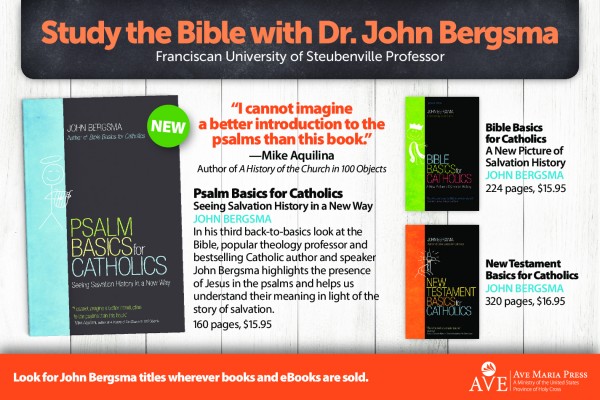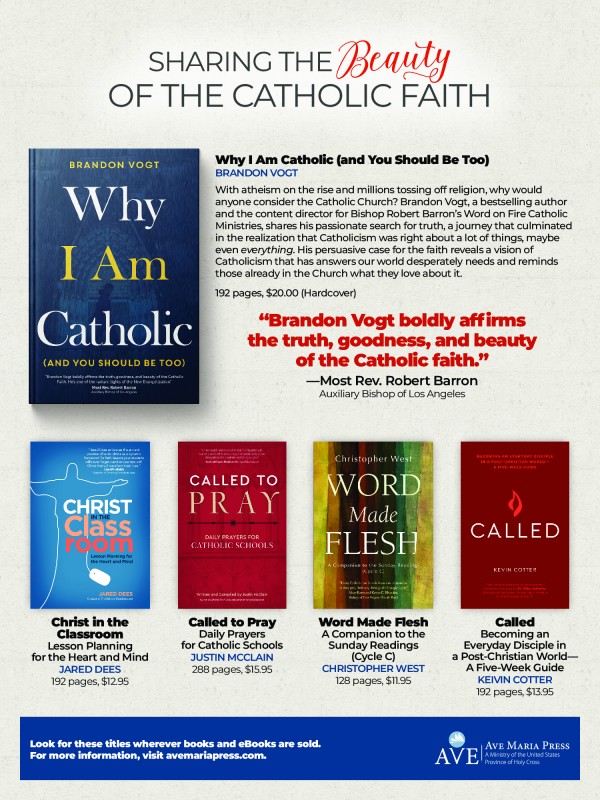AD: New Bible Study by John Bergsma
This is a paid advertisment. To order these books or others from Ave Maria Press click here or call (800) 282-1865, ext. 1.

AD: Ave Maria Press—Sharing the Beauty of the Catholic Faith
This is a paid advertisment. For more from Ave Maria Press click here or call (800) 282-1865, ext. 1.

RCIA & Adult Formation: Catechizing the “Quasi-Catechumens”
The catechesis of adults is one of the great catechetical challenges in this time of the New Evangelization. This is a particularly difficult and unique challenge because, as we are all keenly aware, many of the adults in our parish pews are poorly catechized and are not only in great need of authentic and systematic catechesis but are also in need of a evangelization, or a presentation of the basic Gospel message. St. John Paul II addresses this reality in Catechesi Tradendae when he refers to many adult Catholics as “quasi-catechumens.” He reminds us that adult catechesis today needs to be “directed to those who in childhood received a catechesis suited to their age but who later drifted away from all religious practice and as adults find themselves with religious knowledge of a rather childish kind. It is likewise directed to those who feel the effects of a catechesis received early in life but badly imparted or badly assimilated” (art. 44). If we are honest in our assessment, quasi-catechumens comprise perhaps 70 to 80% of the adults occupying the pews at any given Sunday Mass. To make things even more urgent, the New Evangelization requires and even demands that the lay faithful take up their particular baptismal vocation to be present and active in the ordinary places of secular culture, and to work within it like leaven to build up the kingdom of God.[i] Until the laity are able to understand and live out this crucial mission, the New Evangelization is in danger of never becoming a reality despite the extraordinary movement and promptings of the Holy Spirit in our time. St. John Paul II expresses this urgency clearly when he states, “A new state of affairs today both in the Church and in social, economic, political and cultural life, calls with a particular urgency for the action of the lay faithful. If lack of commitment is always unacceptable, the present time renders it even more so. It is not permissible for anyone to remain idle.”[ii]
Changing the Subject: Forming People to Encounter Mystery
 There is a scene in the film Good Will Hunting where Sean (Robin Williams) and Will (Matt Damon) share a pivotal conversation on a bench overlooking a swan-filled lake. The week before, Will quickly and incisively interprets a painting that Sean had created and hung in his office.
There is a scene in the film Good Will Hunting where Sean (Robin Williams) and Will (Matt Damon) share a pivotal conversation on a bench overlooking a swan-filled lake. The week before, Will quickly and incisively interprets a painting that Sean had created and hung in his office.
Tailored Accountability: The Art of Pastoral Accompaniment
This article opens with stories of Jan Tyranowski and Karol Wojtyla, Saints Ignatius, Peter Faber and Francis Xavier to supply us with a picture of the value of real pastoral accompaniment, wherein a more personally directed style of formation takes place, either alongside traditional classroom catechesis, or, for a season at least, instead of the classroom lecture style of formation. Pastoral accompaniment, whether formal or informal, takes place when a spiritually experienced mentor walks with a less-experienced disciple through the steps of gaining maturity. It could be called a type of spiritual life-coaching. In recent years, the Holy Spirit has been calling for a renewal of pastoral accompaniment in the Church. Pastoral accompaniment is not the same as spiritual direction, although there are similarities and overlaps. The term “spiritual friendship” or “spiritual mentoring” might be more apt to convey the sense of what the Spirit seems to be inviting the Church to develop. Accompaniment happens when one who has been practicing the spiritual life with some intentionality advises another who wants to grow in the spiritual life.
Pastoral Accompaniment and Catechetics
This article is the first of a two-part discussion of an area of critical importance for those working in any ministry setting—clergy or laity—whose interactions with others require mentoring skills, evangelical hospitality, ongoing pastoral interactions in the course of catechetical work, small group facilitation, parenting, nurturing, and intercessory prayer outreach. This first article addresses pastoral accompaniment’s fundamental relation to good catechetics. The second article will explore practical and creative ways to implement such formation in ministry settings. “I never look at the masses as my responsibility; I look at the individual. I can only love one person at a time, just one, one, one… So you begin. I began – I picked up one person. Maybe if I didn't pick up that one person, I wouldn't have picked up forty-two thousand… The same thing goes for you, the same thing in your family, the same thing in your church, your community. Just begin – one, one, one.” ~ St. Teresa of Calcutta Did the early Church have emails, blogs, social websites, EWTN, publishing powerhouses that provided pamphlets, holy cards, books, CDs, DVDs, or even Bibles? Did the early Church have parish bulletins, flyers, posters, handouts, parishioner mailings, media racks, certified catechists, great circuit speakers from afar, even DREs? Did the early Church have lovely vestments, soaring art, beautiful baptismal fonts, gilded altars, glowing monstrances, well-designed hymnals, even church buildings? Did the early Church have devotional societies, knights, sodalities, bazaars, spaghetti dinners, golf tournaments, vacation Bible schools, elementary schools with professionally printed textbooks, private colleges filled with faithful professors, or even bingo? Did the early Church have highly developed devotional traditions, a calendar full of feast days, a liturgy that organizes Christ’s life for us, or even offertory envelopes? The point is not that any of this is in any way bad. The point is that the Church grew by leaps and bounds without any of it. All of that good stuff can be a huge help, but none of it can make up for the lack of people that seek to “pick up just one,” and not count the cost. What did the early Church have? 1) Apostles, 2) the first generation of bishops and priests and deacons, 3) a laity made up of people who were discipled in such a way that following Jesus and sharing Jesus were indistinguishable, 4) martyrs at all social levels and ages. All of this was made possible by two factors: people who lived as other Christs and sacramental grace to lift that witness beyond human weakness. St. Paul is frequently invoked as a person who would use all the modern forms of reaching out if they were available to him, but this would never replace him being sacrificially present to souls. Do you and I prioritize that?
Editor's Reflections: Learning to Live the Catholic Faith
What does it mean to learn the Catholic Faith? Certainly there are names and historical periods that are important. Essential revealed truths must be understood. This is so because it is God’s revelation that has been entrusted to the Church, a revelation that all the baptized have a right and a need to hear and understand over a lifetime. There is a story to grasp, that of salvation history and our particular place in it.
AD: Pauline Books & Media—Books on Discernment, Saints and more
This is a paid advertisement in the July-September 2018 issue. Advertisements should not be viewed as endorsements from the publisher. To find out more about products from Pauline Books & Media call 800-878-4463 or visit www.PaulineStore.org
AD: Powerful Movies on Great Saints
This is a paid advertisement. To view the lives of the saints movies from Ignatius Press, click here or call 800-651-1531 to order.

RCIA & Adult Faith Formation: Supporting New Catholics throughout the Neophyte Year
What is the Neophyte Year?
Many of us may be aware of the RCIA process that is undertaken in many parishes, but have we stopped to ask ourselves the question, “What happens to the new Catholics after the Easter Vigil?” The Rite of Christian Initiation of Adults offers a period of Mystagogy for the seven weeks leading up to Pentecost, but then what?
The new Catholic, for the period up to the anniversary of their reception into the Catholic Church, is known as a “neophyte,” that is, “one who is initiated at the Easter Vigil. The term comes from the Greek word meaning newly planted.”[1] During this period, the parish should support the new Catholics in various ways to deepen their understanding of the faith. Ongoing catechesis is a necessary undertaking, if we are to continue to grow in faith and in love of Jesus Christ. This is echoed in the experience of the apostolic and early Church; for example, St. Paul counselled against neophytes becoming bishops too early (cf. 1 Tim 3:6) “lest their lack of experience in the faith render them arrogant or deficient.”[2] Similarly, the Council of Nicaea (325 A.D.) prohibited acceptance of a neophyte into holy orders, “lest being puffed up with pride, he fall into the judgement of the devil.”[3] It is clear from this prohibition that even in the fourth century, when the period of the catechumenate would have lasted several years,[4] the neophyte is still seen very much as in a period of early spiritual development. The questions might be asked: What kind of spiritual development is needed in new Catholics today? What should be happening during the Neophyte Year?
The Neophyte Year is a time which:
allows the neophytes to reflect on their experience of the sacraments, Scripture, grow closer to Christ through the Eucharist and participate more frequently in the parish. The parish community is called to mentor the neophytes as they begin to live as Christian disciples and fulfill their baptismal vocation to evangelize.[5]
Research into Current Neophtye Formation and Patristic Catechesis
In my M.A. and License studies at Maryvale Institute, Birmingham, I wrote and defended a dissertation on neophyte formation and patristic catechesis. This involved an empirical research element that studied responses of a questionnaire sent to 211 parishes in the Archdiocese of Westminster. It is not necessary to go into the results in any major detail here, but what was of interest was that a large majority of parishes did not appear to offer any ongoing formation during the neophyte year. Admittedly some parishes struggled in finding the extra resources and catechists to support ongoing neophyte formation. I also conducted research into sacramental participation in Sunday Eucharist, because the obligation of a Catholic “to attend Mass on Sundays and holy days of Obligation”[6] is the first precept of the Church. Participation in the Sunday Eucharist is a “testimony of belonging and of being faithful to Christ and to his Church”[7] and a way of witnessing to the truth of the Gospel.
My expectation was that a high percentage would be regularly attending weekly Sunday Eucharist as Christian living “requires being nourished through regular attendance at Mass.”[8] I also expected an enthusiasm for receiving Jesus weekly, because as the YouCat says: “Anyone who is really seeking Jesus’ friendship responds as often as possible to Jesus’ personal invitation to the feast.”[9] However, the reality was that less than 50% of those who had been through RCIA in a five year period were attending Sunday Eucharist weekly.[10] This is a worrying trend, because “some estimates indicate that as many as 50-70% of new Catholics (neophytes) cease to practice their faith within two years.”[11] This illustrates why ongoing neophyte formation should be a priority for parishes.


